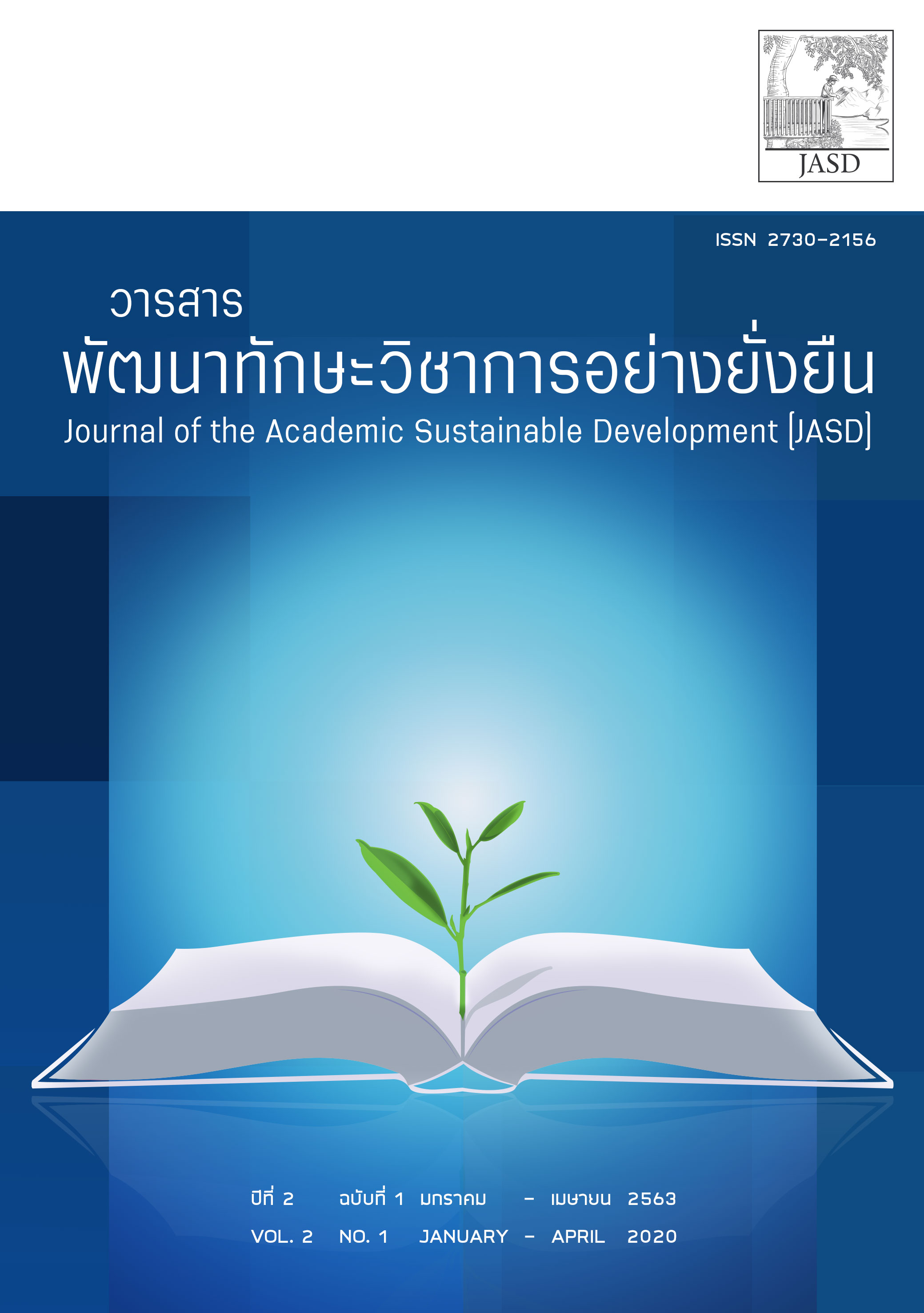The outcome of applying the Yonisomanasikara thinking technique for adjustment among the 3rd-grade students of the lower secondary school of Pibulsongkroh 1 School, Mueang District of Lopburi Province
Keywords:
Yonisomanasikara thinking technique, social adjustmentAbstract
This research project aimed to study and compare the students’ social adjustment ability after attending the training course on the Yonisomanasikara thinking technique, in comparison to the social adjustment ability of students that didn’t attend the training course on the Yonisomanasikara thinking technique. And to study the students’ satisfaction, after attending the training course on Yonisomanasikara thinking technique, with the improvement of their social adjustment ability. The samples of this project were 20 3rd grade students of the lower secondary school of Pibulsongkroh 1 School, Mueang District of Lopburi Province, during the Academic Year 1/2018. The samples were picked from students with social adjustment-related problems. The instruments used were, including, the activity schedule for the training course on Yonisomanasikara thinking technique, the social adjustment evaluation form, and the satisfaction survey for attending the training course on Yonisomanasikara thinking technique. The statistics used were mean, standard deviation, and dependent and independent t-test. The result reveals that; 1) After attending the training course on the Yonisomanasikara thinking technique, students’ social adjustment ability appeared to improve significantly, with the level of statistical significance of .05. 2) After attending the training course on the Yonisomanasikara thinking technique, students who attend the training course appeared to have a higher level of social adjustment ability, in comparison to those who didn’t attend the training course on the Yonisomanasikara thinking technique, with the level of statistical significance of .05. 2) After attending the training course on the Yonisomanasikara thinking technique, students who attend the training course appeared to be highly satisfied with the training course on the Yonisomanasikara thinking technique; with the highest overall score, mean of 4.55, and standard deviation of 0.201.
References
โกวิทย์ พงษ์ภักดี และฉันทนา กล่อมจิต. (2553). การใช้โปรแกรมฝึกการคิดแบบโยนิโสมนสิการเพื่อพัฒนาจิตสารธารณะของนักเรียนชั้นมัธยมศึกษาปีที่ 3. วารสารศึกษาศาสตร์ ฉบับวิจัยบัณฑิตศึกษา มหาวิทยาลัยขอนแก่น. ปีที่ 4(1).
จันจิรา ผึ้งพงษ์. (2560). การพัฒนาความสามารถในการคิดอย่างมีวิจารณญาณด้วยการจัดการเรียนรู้ตามแนวโยนิโสมนสิการ สำหรับนักเรียนชั้นประถมศึกษาปีที่ 6. วารสารศิลปากรศึกษาศาสตร์วิจัย มหาวิทยาลัยศิลปากร. ปีที่ 9(1).
ทิพวรรณ คุณสาร และฉันทนา กล่อมจิต. (2552). ผลของการปรับตัวทางสังคมของนักเรียนชั้นมัธยมศึกษา ปีที่ 1 โดยใช้โปรแกรมฝึกการคิดแบบโยนิโสมนสิการ. วารสารวิจัยมหาวิทยาลัยขอนแก่น (ฉบับบัณฑิตศึกษา). ปีที่ 9(3).
บุญชม ศรีสะอาด. (2556). วิธีการทางสถิติสำหรับการวิจัย เล่ม 1. พิมพ์ครั้งที่ 5. กรุงทพฯ: สุวีริยาสาส์น.
เบญญาพัชร์ วันทอง. (2559). เอกสารประกอบการสอน PGED311: จิตวิทยาบุคลิกภาพ. คณะครุศาสตร์มหาวิทยาลัยราชภัฏพิบูลสงคราม.
พระพรหมคุณาภรณ์. (2556). โยนิโสมนสิการวิธีคิดตามหลักพุทธธรรม. กรุงเทพฯ: สันติศิริการพิมพ์.
พิชิต ฤทธิ์จรูญ. (2557). เทคนิคการประเมินโครงการ. พิมพค์รั้งที่ 2. กรุงเทพฯ: เฮ้าส์ ออฟ เคอร์มีสท์.
วัชรา เล่าเรียนดี. (2556). ศาสตร์การนิเทศการสอนและการโค้ช การพัฒนาวิชาชีพ :ทฤษฎีกลยุทธ์สู่การปฏิบัติ. พิมพ์ครั้งที่ 12. นครปฐม: โรงพิมพ์มหาวิทยาลัยศิลปากร วิทยาเขตพระราชวังสนามจันทร์นครปฐม.
ศรุดา โตษยานนท์. (2553). ปัจจัยที่ส่งผลต่อการปรับตัวกับเพื่อนของนักเรียนช่วงชั้นที่ 1 โรงเรียน เซนต์ดอมินิก เขตราชเทวี กรุงเทพมหานคร. สารนิพนธ์ปริญญาการศึกษามหาบัณฑิต สาขาวิชาจิตวิทยาการศึกษา มหาวิทยาลัยศรีนครินทรวโรฒ.
สมชาย รัตนทองคำ. (2558). เอกสารประกอบการสอน การสอนทางกายภาพบำบัด ภาคต้นปีการศึกษา 2558. ภาควิชากายภาพบำบัด คณะเทคนิคการแพทย์ มหาวิทยาลัยขอนแก่น.
สิรโรจน์ สกุลณะมรรคา. (2557). การปรับตัวของพนักงานต่างชาติต่อบริบทการทำงานแบบไทย กรณีศึกษาพนักงานต่างชาติที่ทำงานในบริษัทโตโยต้ามอเตอร์เอเซียแปซิฟิก-วิศวกรรมการผลิต จำกัด. การค้นคว้าอิสระปริญญาบริหารธุรกิจมหาบัณฑิต มหาวิทยาลัยเนชั่น.
สุมน อมรวิวัฒน์. (2557). กัลยาณมิตรนิเทศ. กรุงเทพฯ: สำนักมาตรฐานการศึกษาและพัฒนาการเรียนรู้สำนักงานเลขาธิการสภาการศึกษา.




